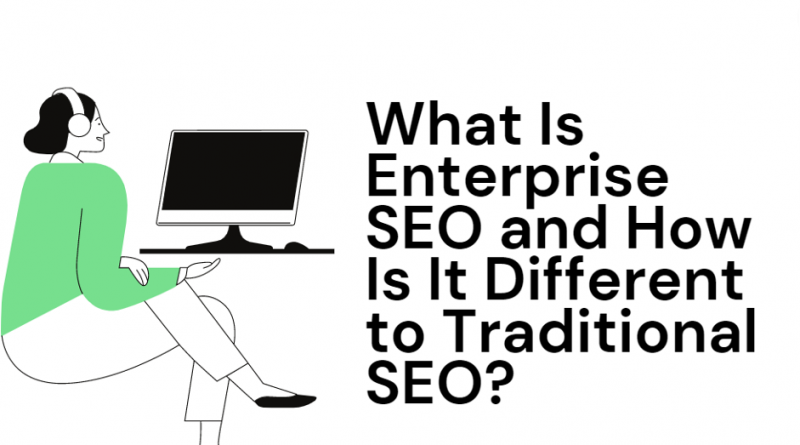What Is Enterprise SEO and How Is It Different to Traditional SEO?
SEO is an essential part of a company’s digital marketing strategy. Optimizing a website for a small business isn’t too hard. But optimizing a website with thousands of pages and keywords is much more complicated. You can’t use SEO strategies for small and mid-sized businesses as a top company.
It is because strategies that work for small organizations might not work for bigger ones. Instead, it would help if you focused on more advanced ways to boost your search engine rankings and brand recognition. It is where SEO for businesses can be beneficial. This blog post will talk about enterprise SEO and how it differs from regular SEO.
What Is Enterprise SEO?
Enterprise SEO uses SEO strategies to improve a large enterprise organization’s search engine rankings and organic presence. Most of the time, these companies are called “large” based on how many pages are on their website, not how many people work for them.
How is SEO for businesses different from SEO in the past?
When working on SEO for a big company, problems, solutions, project timelines, and even small tactics have a more significant effect. Here are seven differences between enterprise SEO and other kinds of SEO.
1. Type of Websites
Small or mid-market businesses with a few (or a couple hundred) web pages use traditional or regular SEO strategies. On the other hand, enterprise SEO is used on large websites or eCommerce platforms with a few thousand to a million pages. So, it makes sense that SEO strategies for small sites might not work well for more significant areas. Many traditional SEO basics and enterprise SEO basics are, of course, the same, but big websites have a lot more layers of complexity.
2. Scaling
The size is another huge difference. SEO methods must scale when a site has hundreds or millions of pages. Natural traffic and brand familiarity won’t matter. Say you have a website with a page for each of your thousands of products. Each category and product page needs much content.
Find hard-to-rank keywords and provide your authors guidelines on how to make the content SEO-friendly, such as what primary and secondary keywords to use, how to produce alt text for images, and more. Each type makes internal linkages differently. Linking between your site’s pages can boost your SEO.
A million-page website has a few broken internal links. You may want to develop a site structure that is SEO-friendly and automatically links pages. Improving each page of a large company site manually or with automation is difficult. Growing can assist. To grow content production, you need expertise in content, design, PR, social media, and branding.
It would be helpful to have SEO professionals find fresh keywords for content marketers. In addition, scaling up might also involve creating a full department, like a content marketing department, and using methods and technologies to ensure they always generate high-quality material.
3. SEO Tools
There are many SEO tools out there, but not all of them can handle the complexity of a website for a big business. It is where enterprise SEO tools can help. When you use an enterprise SEO tool, you can:
- Getting organic search marketing teams to work better
- Searching for new keywords
- Keeping track of results
- Analysis of the competition
- Getting better at and making more content
- Putting together tools for analytics
- Reporting and management of backlinks
- Efficient communication among different departments
- From crawling to conversions, technical analysis is done.
SEO platforms like Ahrefs and SEMrush offer enterprise clients a plan that is tailored to their needs.
4. Keyword Usage
Long-tail keywords with less competition are usually the focus of traditional SEO strategies. But this strategy won’t always work for you if you’re a big company. Enterprise SEO is great because it focuses on short-tail keywords with a lot of competition.
That’s because many big websites have a lot of domain authority. After all, they are big brands. Booking.com, for example, doesn’t use any content marketing strategies, but it still has more than 1.8 billion backlinks from 293.5K domains.
So, even if they wanted to start with content marketing, they would still be ahead of their small competitors. Because of this, it makes sense for more significant sites to focus on highly competitive keywords instead of long-tail ones.
5. Multiple Locations
Small businesses try to get their websites higher in search results by selling goods and services close to home. So, it makes sense that SEO techniques used for years can work well here.
On the other hand, Enterprise SEO focuses on bigger businesses with multiple locations in different countries, sites that need their strategy, and subdomains that hold different types of content.
So, it would help if you focused on making location-specific content for enterprise companies that fit their brand and get people to buy. So, it put most of its SEO work into optimizing for “near me” and voice search. It made it 30% more visible on search engines than its two biggest competitors.
6. Team Support
Enterprise SEOs must ensure all teams work together efficiently to maximize their efforts, unlike smaller organizations. All teams must strive toward the same goal. Because each group has its own goals, it’s challenging to acquire departmental clearance for specific adjustments quickly. A developer can usually fix this easily.
They need approval from development, content, design, and SEO (SEO). Just an H1 tag. Imagine you want to make your website SEO-friendly. Approval usually takes weeks or months. Even so, they may not follow your advice. Enterprise SEO isn’t just about making your efforts bigger or optimizing multiple web pages. You need the right individuals in the correct departments to use your SEO suggestions.
7. The ability to be crawled and indexed
Crawlability and indexability are crucial technical SEO factors that can improve your site’s visibility. And when you have thousands of website pages, they can be a problem. For smaller areas, you don’t have to worry about these things because they are easy to fix. But if the crawl budget isn’t improving, it can be hard to crawl and index large sites.
Conclusion
Enterprise SEO is the way forward for big businesses. If it’s done right, it can help brands become the best in their field. Business sites don’t have to worry about their names being known. But they need an innovative, dedicated team of SEO consultants to protect their domain authority and backlinks and keep the content on thousands of web pages up to date.
Read more:
Top 7 Rules for investors that lead to a successful property dealing

